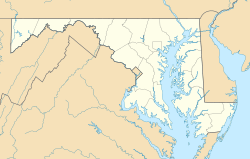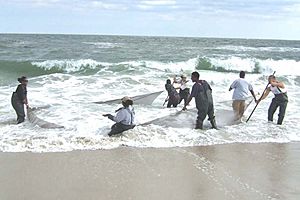University of Maryland Eastern Shore facts for kids
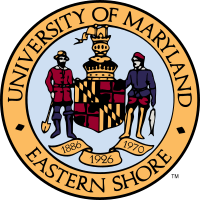
University of Maryland Eastern Shore seal
|
|
| Motto | Facta, Non Verba |
|---|---|
|
Motto in English
|
Deeds, Not Words |
| Type | Public historically black land-grant research university |
| Established | 1886 |
|
Parent institution
|
University System of Maryland |
|
Academic affiliations
|
TMSF Space-grant |
| Endowment | $26.2 million (2017) |
| President | Heidi M. Anderson |
| Provost | Rondall Allen |
|
Academic staff
|
335 |
|
Administrative staff
|
511 |
| Undergraduates | 2,467 (fall 2024) |
| Postgraduates | 696 (fall 2024) |
| Location |
,
U.S.
38°12′43″N 75°41′06″W / 38.212°N 75.685°W |
| Campus | Rural, 1,138 acres (461 ha) |
| Colors | Maroon and gray |
| Nickname | Hawks |
|
Sporting affiliations
|
NCAA Division I – MEAC, ECAC |
| Mascot | Harry the Hawk & HH3 |
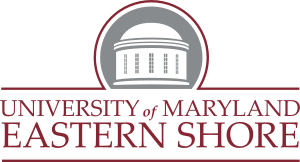 |
|
|
University of Maryland Eastern Shore
|
|
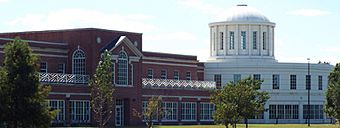
Student Services Center /at the University of Maryland Eastern Shore
|
|
| Location | 1 Backbone Rd., Princess Anne, Maryland |
| Built | 1886 |
| Architect | Booth, W. Wilson; Dashiell, J. Roland & Sons, et al. |
| Architectural style | Colonial Revival, Classical Revival, et al. |
| NRHP reference No. | 05001021 |
| Added to NRHP | September 16, 2005 |
The University of Maryland Eastern Shore (UMES) is a public university in Princess Anne, Maryland. It is known as a historically black college (HBCU). This means it was founded to educate African American students during a time when many schools were segregated. UMES is also a land-grant university, which means it receives special support from the government to teach subjects like agriculture and engineering.
UMES is part of the University System of Maryland. It started in 1886 as the Delaware Conference Academy. Over the years, it has been known by several names, including Princess Anne Academy.
Contents
History of UMES
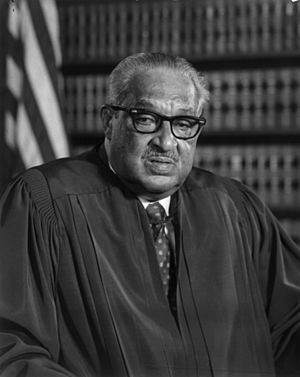
The University of Maryland Eastern Shore has changed its name many times. These names show how the school grew and what its purpose was over more than a hundred years. It first opened on September 13, 1886. It was started by the Delaware Conference of the Methodist Episcopal Church.
Benjamin and Portia Bird welcomed nine students on the first day. They used a converted farmhouse on 16 acres of land. The school was first meant to prepare students for the Centenary Biblical Institute in Baltimore. This institute was also connected to the Methodist Episcopal Church.
From Academy to College
In 1890, the institute in Baltimore changed its name to Morgan College. This was to honor the first chairman of its board. Today, Morgan College is known as Morgan State University. By the end of its first year, 37 students were attending the Delaware Conference Academy in Princess Anne.
At that time, schools in Maryland were segregated. African American students could not attend the Maryland Agriculture College. This college offered advanced training in farming. In 1890, a law called the Second Morrill Act was passed. It said that states had to create colleges for African American students. This was needed to keep getting money for land-grant schools.
Maryland then partnered with Morgan College. This partnership helped provide land-grant education for African Americans on Maryland's Eastern Shore.
Becoming a Public University
Around the year 1900, the school was widely known as Princess Anne Academy. Some people also called it Morgan's "industrial branch." The partnership between the state and Morgan College led to another name: the Eastern Shore Branch of Maryland Agriculture College.
During the Great Depression, Maryland courts ruled that African American students could attend the state's law school. This ruling likely led the state to make Princess Anne Academy a public school.
Fifty years after it opened, the school officially became state-owned. This happened as it began offering four-year college degrees. The University of Maryland in College Park became its main administrator. In 1948, the Eastern Shore Branch of the University of Maryland was renamed Maryland State College.
On July 1, 1970, Maryland State College became the University of Maryland Eastern Shore. Today, it is one of 12 public universities in the University System of Maryland. Besides its main campus, UMES also has a research farm and a coastal ecology center.
Recent Developments
UMES offers many different study programs. These include 37 undergraduate degrees, 15 master's degrees, and eight doctoral degrees. Many of these programs are recognized by other schools.
In 2020, MacKenzie Scott gave $20 million to UMES. This was the largest single gift the university had ever received.
Academic Programs
UMES is organized into five main schools. Each school focuses on different subjects:
- School of Agricultural and Natural Sciences
- School of Education, Social Sciences, and the Arts
- School of Business and Technology
- School of Pharmacy and Health Professions
- School of Graduate Studies
Student Life
UMES has a diverse student body. As of 2022, about 76% of students were Black. About 9% were White, and 4% were Hispanic. Students from other backgrounds make up the rest. Many students at UMES come from lower-income families, with about 53% being low-income.
Athletics at UMES
The UMES sports teams are called the Hawks. They compete in NCAA Division I, which is the highest level for college sports. UMES was one of the first members of the Mid-Eastern Athletic Conference (MEAC) in 1970. The school left the MEAC for a short time but rejoined in 1981.
The Hawks compete in 15 sports. These include seven men's sports and eight women's sports. Before 1970, the university was part of the Central Intercollegiate Athletic Association in Division II.
Football History
UMES was once very strong in college football for Black colleges. They had five undefeated seasons between 1947 and 1960. However, running a Division I football program became too expensive. Also, the school had to follow Title IX rules, which ensure fairness for women's sports. Because of these reasons, the football team was stopped after the 1979 season.
In 1948, Maryland State College played Albright College. This was one of the first football games between a historically Black school and a mostly White school. In 2013, UMES decided not to bring back football. However, they said they might look at the idea again in the future.
Many UMES alumni have played in the NFL. Art Shell, a famous NFL player and coach, went to UMES. In the 1968 Super Bowl, four UMES alumni played in the game. This ties UMES with Florida State for the most alumni in a single Super Bowl.
Bowling Success
The UMES women's bowling team has won several national championships. They won the NCAA Bowling Championship in 2008 and 2012. In 2008, they beat Arkansas State University in the final. In 2012, they won against Fairleigh Dickinson University.
In 2011, the team won their second NCAA Bowling Championship. They also won the USBC Team Championships and the MEAC Championship that season. In 2007, they finished second in the NCAA National Championship. The women's bowling team also won the MEAC Championship in 2000, 2006, 2007, and 2008.
Basketball and Track
The UMES men's basketball team was coached by Jason Crafton. In the 1973–1974 season, they led the nation in scoring. They scored 97.6 points per game. The team made it to the quarterfinals of the 1974 NIT tournament.
In 2011, two UMES basketball players, Hillary Haley and Casey Morton, scored over 1,000 career points. The next season, Adobi Agbasi became the all-time shot-blocker for UMES women's basketball.
The Hawks men's outdoor track team has also had success. In 2011, they were ranked third in their region. In 2012, three UMES track athletes earned All-America status. One of them, Lénora Guion-Firmin, later joined the French team for the 2012 Summer Olympics. In 2014, the men's team won the MEAC Cross Country Championships.
Volleyball Achievements
The UMES women's volleyball team won its first MEAC championship in 2011. They beat Florida A&M in the final game. This win earned them their first trip to the NCAA Tournament. They repeated as MEAC champions in 2012. The team has won the MEAC Northern Division for six years in a row. They also have a long winning streak at home games.
Notable Alumni
| Name | Class year | Notability | |
|---|---|---|---|
| David Banner (Lavell Crump) | Rapper | ||
| Emerson Boozer | 1965 | former NFL player | |
| Roger Brown | 1960 | former NFL player | |
| Earl Christy | 1967 | former NFL player | |
| Clarence Clemons | Professional saxophonist with Bruce Springsteen & The E Street Band | ||
| Linda Y. Cureton | 2020 | PhD, former NASA CIO | |
| James Duncan | former NFL player | ||
| Brasheedah Elohim | American-Israeli women's professional basketball player | ||
| Carl Hairston | 1975 | former NFL player and coach | |
| Merrecia James | 2008 | track and field middle distance runner from Jamaica | |
| Charles Mays | 1964 | Olympic long jumper and New Jersey State Assemblyman | |
| Wanda Peters | NASA administrator | ||
| Earl S. Richardson | 1965 | Morgan State University President | |
| Johnny Sample | 1958 | former NFL player | |
| Art Shell | 1968 | Pro Football Hall of Fame player and former NFL head coach | |
| Ira Smith | 1990 | former minor league baseball player | |
| Charlie Stukes | 1967 | former NFL player | |
| Billy Thompson | 1969 | former NFL player | |
| Joe Williams | American football player |
Notable Faculty
- Heidi M. Anderson
- Mike Hall
- Mignon Holland Anderson
- Vernon McCain
- Ulysses S. McPherson
- Jack Thomas
- Frank Trigg
 | Toni Morrison |
 | Barack Obama |
 | Martin Luther King Jr. |
 | Ralph Bunche |


